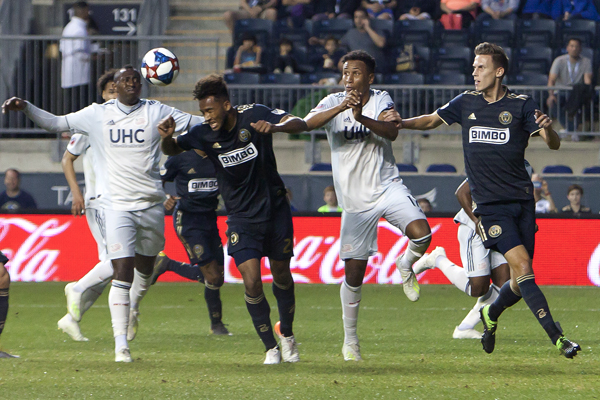Photo: Marjorie Elzey
While the Philadelphia Union have undergone changes on the field and in the front office this year, there is one element that the club can’t seem to shake.
After strong, even stellar, rookie seasons the club’s rookies and homegrowns seem to regress the following season. First it was Josh Yaro and Keegan Rosenberry, then it was Jack Elliott, now the theme continues with Auston Trusty and Mark McKenzie.
Are these troubling second seasons signs of development and learning with experience, or proof of expectations set too high? Is it possible the young players have played too often, too soon? Are the Union risking winning now in favor of player development, or can the two be mutually achieved? Overall, what does these slumps mean for player development and confidence?
Growing pains or overrated?
I personally believe that it is way too early to label either Trusty or McKenzie overrated or a bust at this point in their career. History of past rookies shows that these are more than likely growing pains for Trusty, as well as McKenzie who is fighting to get back into the starting XI. Fellow centerback Jack Elliott was a candidate for Rookie of the Year in 2017, then saw his playing time almost cut in half in 2018. Partly due to the emergence of Trusty and McKenzie, Elliott was tied to the bench for almost half the season, unable to play his way into the XI. Now in 2019, Elliott is the best centerback on the team, and one of the best in MLS.
Further evidence of growing pains lies with Keegan Rosenberry. After an All-Star 2016 season, in which he played in every game for the Union, Rosenberry took a massive step backwards in 2017. Losing his spot to Ray Gaddis, he only started 11 games and earned himself a team suspension for attitude problems. Rosenberry then found himself back in good graces in 2018, helping the team make the playoffs with a career high 3 assists.
Learning and playing through hardship should be an experience that make Trusty and McKenzie better.
Playing too often
We all know that Auston Trusty played every minute for the Union in 2018, even in the Open Cup.
But was that best thing for his development? Has he played so much that the opposition has already figured out his weaknesses and how to exploit them? Could this also be a reason for Rosenberry’s struggles in 2017?
While its debatable, I think its a rather large factor for these slumps. It’s a factor that may have already been identified by the front office as well. We’ve seen Trusty given more breaks this season as well as Brenden Aaronson rarely playing a whole 90 minutes in a match.
Jim Curtin has seemed to change his approach with Anthony Fontana and Matt Real, allowing them to play 90 minutes for Steel and making appearances for the Union as substitutes. This allows both to gain experience and confidence even though they currently are not starting. With a fully fit McKenzie, don’t be surprised to see more squad rotation between him and Trusty.
Win now?
It’s not hard to see that Ernst Tanner has built the Union, and wants the Union, to win now. His roster has the team in first place more than halfway through the season. But has player development gotten in the way of winning now? Or can they both be achieved with this roster. Trusty and Aaronson have played a large role in the team’s success this season, but have also seen their lack of experience cost them in moments. Would the Union be better served starting Aurlien Collin instead of Trusty to create cohesion and calmness for the backline? Should Aaronson follow Fontana and Real in playing for Steel and briefly for the Union when the midfield is fully fit? We’ve seen Jim Curtin reluctant to make changes in the past, but the win now mentality may force him to this season.
Player development and confidence
Overall, the young players on the Union should be fine. They’re in an environment where they have the trust of their coach and opportunities to regain their confidence. Whether they are role players or starters, Jim Curtin has allowed each player an opportunity to play their way into the squad, and trusting in them to make an impact. Their struggles also provide an opportunity for growth and development. If developing first team players, with European ambitions, was easy then every MLS team would do it. Short term struggles can lead to massive returns in the long run, and the Union don’t have to look far for evidence.


I think part of the issue is recovery time. I’m not sure what life at the academy is like, but Elliott and Rosenberry (and Yaro and Herbers) came out of college where they played a 4 month season. Then they jump into the 8 month MLS season along with a month and a half of training camp, and their bodies are probably not ready to recover as quickly as necessary to prepare for the following season. By the end of their sophomore season, they are starting to get used to the longer season and the shorter offseason.